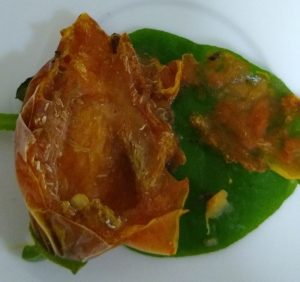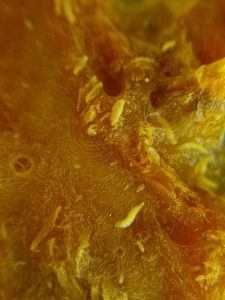Thanks to all the people who have contributed to this week’s newsletter: Angelo Eliades, Bruno Tigani, Cathy Romeo, Chris Kent, Doris Glier, Doris McAllister, Gilles Lardy, Heb Gardener, Marina Bistrin, Megan Goodman, Pam Jenkins and Rita Varrasso.
What farmers’ markets will be happening this weekend?
On Saturday: Coburg. Not Carlton
On Sunday: Alphington and Eltham. Not Yarra Valley.
Eltham Farmers’ Market now publishes a regular newsletter. Sign up here.
Read about the insect-repellent properties of Artemisia and other aromatic plants
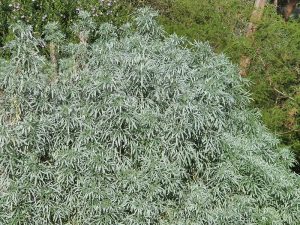 Marina Bistrin has been wondering what use she can put her Artemisia (wormwood and souternwood) prunings to. She has also been reading a book by the late, great Juliette De Bairacli Levy’s entitled The Illustrated Herbal Handbook for Everyone. The end result of these two activities is an article that she has written for our website on the insect-repellent properties of Artemisia and other aromatic plants. Read the article.
Marina Bistrin has been wondering what use she can put her Artemisia (wormwood and souternwood) prunings to. She has also been reading a book by the late, great Juliette De Bairacli Levy’s entitled The Illustrated Herbal Handbook for Everyone. The end result of these two activities is an article that she has written for our website on the insect-repellent properties of Artemisia and other aromatic plants. Read the article.
Some guides to pesticide effects on beneficials
Bruno Tigani is a local (Lower Plenty) wholesaler of seeds (Griffin Seeds) who periodically gives away hundreds of leek seedlings to our newsletter readers. As a wholesaler to the commercial vegetable seed industry, he receives various publications from Horticultural Innovation Australia. Bruno has written in: “Not all pesticides are equal, clearly insecticides are more harmful than fungicides to insects. In regards to insecticides, biological insecticides are relatively ‘soft’, in that they do not harm beneficial insects as much as synthetic chemistry does. Also, being able to recognise the beneficials among various pests in the garden is key to having the confidence to let nature take its course and not immediately rush to a chemical pest solution. Hort Innovation has produced some guides on the effects of pesticides on beneficial insects. Whilst these guides are aimed at commercial producers, they contain some good information relevant to home growers.“
Here are the guides:
Thanks, Bruno!
The guides were funded by Hort Innovation using a vegetable research and development levy plus contributions from the Australian Government. Hort Innovation is the grower-owned, not-for-profit research and development corporation for Australian horticulture.
Rotting capsicums
Pam Jenkins has written in: “Here is a couple of photos of part of a capsicum that was rotting on the plant. In the past, my capsicums have ripened slowly over winter and I have never had problems with them rotting. I brought the capsicum inside, inspected it and saw nothing untoward but put it in the freezer anyway. The photos show what I found when I pulled it out. One grub was easily visible to the naked eye, much smaller than a grain of rice, and the other magnified photo shows many more. I presume that they are fruit fly larvae ready to pupate in the ground and emerge when the weather is warm enough in spring. Stay alert everybody!“
Opportunities for combining home growing and community in Darebin
Darebin Seed Library
Darebin Council is developing a seed library to help gardeners access, grow, save and swap heirloom and locally adapted vegetable and flower seeds. They will be installing ‘little seed library’ boxes in gardens across Darebin. To get you started, they will give you some open-pollinated, heirloom and local seeds, the idea being that you grow the plants and then donate some of the seeds back to the seed library. To register your interest in either hosting a seed library or receiving some start up seeds, either book a place on this online workshop or email Natalie Nigol (Natalie.Nigol@darebin.vic.gov.au).
DIVRS seedlings
DIVRS wants to encourage more home food growing in Darebin. They are offering to give you free seedlings for your Spring plantings in return for which you keep the community up to date with your growing journey via Instagram and share some of your harvest.
Do you know? ?
Doris McAllister asks: “Why I can’t collect any worm juice? I have a plastic 3 litre kit, it’s tilted and the tap is clean but still no juice. Any suggestions?” Email your answers.
 The pickle sisters
The pickle sisters
The picture right is supposedly of a 1920 vaudeville group called The Pickle Sisters. Email your puns and we’ll publish them next week. Thanks for the heads up, Heb Gardener.
Another article from Angelo Eliades
Are woody galls on citrus tree trunks harmful?. Hint: Angelo’s basic answer is ‘no’. Note that woody gall (which is caused by a virus) is completely unrelated to citrus gall (which is caused by a wasp).
Read more of Angelo’s food-related articles.
Guy’s food growing tip – tromboncino
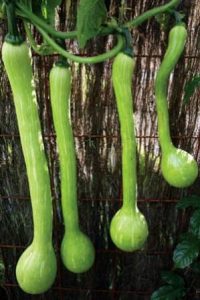 When planning what veggies to plant this Spring, consider tromboncino. In terms of both texture and taste, it is roughly halfway between a pumpkin and a zucchini. In terms of growth pattern, it is a vine (like standard pumpkins) but can be grown up vertical structures (unlike standard pumpkins). And its massively long and unusual fruit are both interesting and a talking point.
When planning what veggies to plant this Spring, consider tromboncino. In terms of both texture and taste, it is roughly halfway between a pumpkin and a zucchini. In terms of growth pattern, it is a vine (like standard pumpkins) but can be grown up vertical structures (unlike standard pumpkins). And its massively long and unusual fruit are both interesting and a talking point.
I am running out of ideas for food growing tips. Email me with your suggested topics.
Meg’s social isolation week
With the uncertainty in Melbourne this week, I have not managed to spend as much time in the garden as I would like but I can see that the daffodils are out and their happy colour makes me smile. The plum tree is in blossom and buds are just starting to appear on the apples. I am determined to make the time to take last month’s apple cuttings out of the fridge crisper and attempt grafting. I unwrap the damp newspaper and am a little surprised to see that they remain in good shape. I choose pieces that are of a similar thickness to the shoot that I intend to graft to and make a long slanting cut into the end of both the bud wood and the bud on the branch that I think will work so that they slide/ match together. I bind the two together with grafting tape and hope for the best. A little hope is something we all need right now.
I collect some spinach and silverbeet for dinner. It is still cold enough for comfort food such as ricotta gnocchi. This recipe takes some time, but is worth the effort.
Green ricotta gnocchi
600g of mixed greens such as silverbeet (leaves only) and spinach
250g ricotta
50 parmesan (plus extra to serve)
1 egg
¼ teaspoon nutmeg
100g plain flour
a good pinch of salt
Blanch the greens, squeeze out all of the water and chop finely.
Add all ingredients in a large bowl and mix well until it forms a dough (add a little extra flour if needed).
Roll out strips of dough on a floured surface (like rolling sausages) and cut into 3 cm pieces. Flatten each piece slightly with a floured fork. Place on a tray lined with baking paper and refrigerate for about half an hour.
Cook in salted water in small amounts until the gnocchi rise to the surface.
Serve with a sauce of your choice. Alternatively, place into a greased baking dish, dotted with about 40g butter, sprinkle with extra parmesan cheese and place under a hot grill for about 4 minutes.
Reader photos
Last week’s theme – unusual veggies you have grown
7 photos were submitted.
| Cathy Romeo Zucchini blossoms While most people grow zucchini for the actual zucchini, the blossoms themselves are delicious too, and quite a delicacy, especially stuffed with cheese and fried or turned into fritters. Pick the blossoms early in the morning when they are at their best. You can eat both the male and female flowers. You can also pick the whole young zucchini with the female flower still attached. |
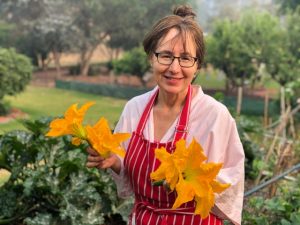 |
| Chris Kent Unnamed I’m counting the strawberries as vegetables. Ditto the tomatoes. |
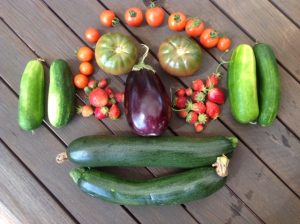 |
| Gilles Lardy Cantaloupe delice de la table |
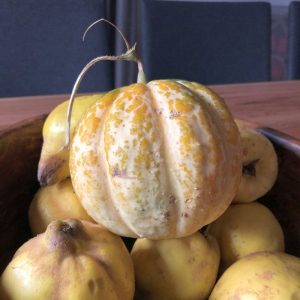 |
| Marina Bistrin Amaranth This is a single giant amaranth – an accidental self-sown growth from my ordinary 2 metre tall ones that grow in my garden. This one was 3+ metres tall and has a stalk about 6cm across at the base. I have saved the seeds in case someone has a use for this as an annual that is both edible and a wind-break/shade plant. |

|
| Marina Bistrin Chicory This is a groundcover variety of chicory that spreads by runners. It is used as a salad green that has a slight bitterness and was given me by a Serbian woman. It grows all year round so is useful to have. It grows in part shade and has beautiful flowers. It is invasive but, as the roots don’t grow very deep, it isn’t too difficult to get rid of. |
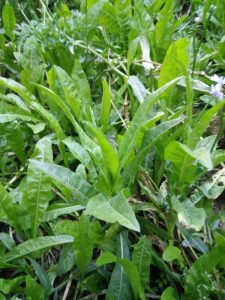
|
| Marina Bistrin Common nettle (Urtica dioica) [Editor: Per Wikipedia, Urtica dioica has a flavour similar to spinach mixed with cucumber when cooked, and is rich in vitamins A and C, iron, potassium, manganese, and calcium. In 2014, someone ate 24 metres of raw nettles to win that year’s World Nettle Eating Championship. Read Jo Douglas’ recipe for nettle soup on our website.] |
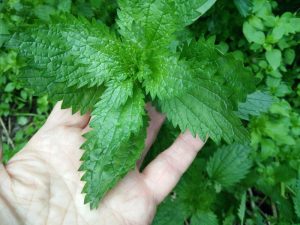
|
| Rita Varrasso Tromboncini Tromboncino means little trombone in Italian. But these climbing pumpkins, grown from food swap seed, were a huge 90cm long and weighed 5 kilos each. [Editor: tromboncini, like zucchini, is harvested and eaten when it is immature. The Americans call such pumpkins ‘summer squashes’.] |
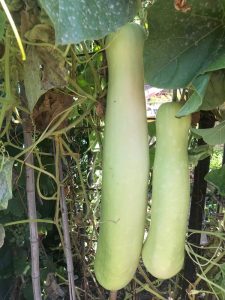 |
Cathy also sent in a little Italian primer which I have expanded upon:
- ‘Zucchini’ is the plural of ‘zucchino’ in Italian. ‘Tromboncini’ is the plural of ‘tromboncino’. But, for some reason, we say zucchini and tromboncino rather than, for example zucchino and tromboncini.
- ‘Zucchini’ is the diminutive of ‘zucca’ in Italian, meaning ‘pumpkin’. So zucchini means ‘little pumpkins’.
- Whilst the Italians call them zucchini, the French call them courgettes. Whilst the Australians call them zucchini, the British tend to call them courgettes. And when they are fully-grown, the British call them marrows.
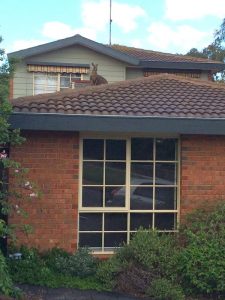 The theme from two weeks ago – vertebrates
The theme from two weeks ago – vertebrates
The most popular link from last week’s newsletter was Doris Glier’s (extraordinary) photo of a kangaroo on a house roof. Several of you expressed bafflement about the photo and asked me if I could find out any more. I therefore asked Doris and this is her reply: “It happened a few years ago that I heard some unexplained noises on my early morning walk along Plenty River Drive. To my surprise, I spotted a kangaroo on a house roof. I’ve no idea how it got that high up there. The house owner was disturbed by the unusual noise and came out in her dressing gown, expecting a possum. She couldn’t explain how the kangaroo found its way up so high either.”
Better still, Doris took a video of the kangaroo and has given us permission to publish it in this newsletter: watch the video. When Doris published the video on her Facebook page, it was shared around 5,000 times!
This week’s theme – animal deterrents
 This week’s photo theme will be ‘animal deterrents’ – devices that are used to deter animals from eating your plants. As ever, send me your interesting photos, together with a title and (if you want) a story, and I will publish them next week.
This week’s photo theme will be ‘animal deterrents’ – devices that are used to deter animals from eating your plants. As ever, send me your interesting photos, together with a title and (if you want) a story, and I will publish them next week.
To get you started, here is a video of the world’s best scarecrow (well, the best scarecrow that I have seen recently).
I first saw this scarecrow video on the Warrandyte Garden Facebook group, which is one of the more active local gardening-related Facebook groups.
Which link was clicked most times in the last newsletter?
Doris Glier’s photo of a kangaroo on a house roof.
Joke of the week
Why did the students eat their homework? Because the teacher said that it was a piece of cake.
Read more jokes.
Upcoming online events
If you know of any events other than those listed below, email me.
Newly announced events
Modern Indian cooking (Thermomix): Saturday, 15th August, 2-3.30m; free; organised by Libby Bracchi. Read more and book on EventBrite.
Bee a pollinator! Native bees with Katrina: Monday, 17th August, 7.45-9pm; $14; organised by laneway Learning. Read more and book on their website.
Edible weeds walk: Saturday, 22nd August, 11am-1pm; $28; organised by Very Edible Gardens. Read more and book on their website.
Authentic Indian cookery in Thermomix: Saturday, 22nd August, 2-3pm; free; organised by Sharyn Vanderhorst. Read more and book on EventBrite.
Social gardening for Manningham residents: Tuesday 25th August, Tuesday 8th September and Tuesday 22nd September, each 1.30-2pm; free; organised by Kevin Heinze Grow. Book by either phone (9848 3695) or email.
Intro to growing nutrient dense food: Thursday, 27th August, 7-9pm; $50; organised by CERES. Read more and book on Humanitix.
Grow into Spring: Saturday, 29th August, 10am-midday; $50; organised by CERES. Read more and book on Humanitix.
Darebin seed saver champion training with Kat Lavers: Saturday, 29th August, 2-4pm; free; organised by Darebin Council. Read more and book on EventBrite.
Mycocycling cultivation on household waste: Saturday, 29th August, 1.45-3.30pm; $28; organised by MYCOmmunity. Read more and book on their website.
Nutrition for families: Saturday, 29th August, 2.30-4pm; $16; Central Ringwood Community Centre.
Previously announced events
Making composting and worm farming easy: Wednesday, 12th August, 7-8.30pm; free; organised by Whittlesea Council. Book by email (Sylvia.jones@whittlesea.vic.gov.au).
Chicken tikka masala: Saturday, 15th August, 5-6pm; $29; organised by Cook Indian by the Creek. Read more and book via Facebook.
Making composting and worm farming easy: Tuesday, 18th August, 1-2.30pm; free; organised by Whittlesea Council. Presenter: Angelo Eliades. Book by email (jocelyn.harte@whittlesea.vic.gov.au).
What’s wrong with ultra-processed foods?: Tuesday, 18th August, 1.30-2.30pm; free; organised by University of Melbourne.
Advanced home composting and worm farming: Wednesday, 19th August, 7-9pm; free; organised by Manningham Council. Read more and book on EventBrite.
Sourdough bread making: 4 occurrences – 22nd August 10-11am, 23rd August 2-3pm, 12th September 11am-midday and 13th September 3-4pm; $20; organised by Living & Learning Nillumbik. Read more and book on their website.
Introduction to brewing and fermenting: Saturday, 22nd August, 2-4.15pm; $28; organised by MYCOmmunity. Read more and book on their website.
Zero waste cooking and sustainability: 7 sessions, on Tuesdays, starting 25th August, each 10am-1.30pm; free; organised by Jesuit Community College. Read more and book on WeTeachMe.
Explore our food systems: Thursday, 27th August, 12.30-1.15pm; $0-20; organised by CERES. Read more and book on Humanitix.
Rogan josh: Saturday, 29th August, 5-6pm; $29; organised by Cook Indian by the Creek. Read more and book via Facebook.
Open Table offer their weekly no waste cook club workshops free and online on Saturdays. As well as cooking (which is actually optional), you will learn about food waste and composting. Register on EventBrite.
Pip Magazine (some of whose journalists live in North East Melbourne) are producing a series of videos entitled simple skills for self sufficiency.
All The Dirt is a weekly podcast about gardening.

